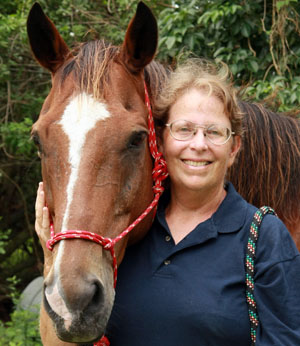TAILS FROM THE TRAILS
A few weeks ago, the Healing Horse Therapy Center welcomed friends and visitors to its open house. “It’s an open house and a meet-and-greet, plus a used tack sale, a bake sale and an art sale,” said owner and founder Maurette Hanson. “We’re hoping to welcome old and new friends, get the word out about our programs and also raise some money.”
The nonprofit, located on 10 acres off C Road in Loxahatchee Groves, currently uses seven horses in its programs. A member of the Professional Association of Therapeutic Horsemanship International, the group provides programs that support clients with special physical and/or mental needs. Professional staff and volunteers work closely with riders to ensure safe riding sessions. Riders are assisted by two people who walk alongside the horse, as well as a horse leader.
Therapeutic riding uses equine-assisted activities for the purpose of contributing positively to cognitive, physical, emotional and social well-being of people with disabilities. Because horseback riding rhythmically moves the rider’s body in a manner similar to a human gait, riders with physical disabilities often show improvement in flexibility, balance and muscle strength. Riding also provides recreational opportunities for enjoying the outdoors.
Equine facilitated learning is an educational approach to equine-assisted activities, using horses to teach critical life and communication skills. Since horses mostly use nonverbal communication, they’re wonderful teachers to help people understand how such unspoken communication influences others. They expose internal conflicts, supporting self-growth and self-awareness.
Equine facilitated psychotherapy pairs licensed mental health and equine professionals to address psychotherapy goals. Horses are extremely sensitive to changes, and react and respond differently based on someone’s emotional state, acting as large biofeedback machines. As a client reduces anxiety, the horse’s behavior changes, providing beneficial information to the professionals.
The Horses for Veterans program is a group therapy activity incorporating these therapies to help military veterans and survivors of military sexual trauma cope with issues such as post-traumatic stress disorder. It helps build relationships and trust, and gives clients a toolbox of relaxation techniques to use in real-life situations. Each veteran is paired with one horse for the duration of the program. No previous horse experience is necessary.
When I visited on an overcast Saturday afternoon, about two dozen people wandered through the airy barn, reaching over stall doors to pet horses, sampling horse-themed cupcakes, having their faces painted and checking out the used tack.
“Everything’s going fine,” Hanson said. “We hope to get some funding for a couple of new projects. We need a large mounting block built, and also hope to add an interactive horse and human playground. We serve about 10 clients weekly. Mostly, I want people to know we’re here and what we offer.”
Katerina LeAndro, a photographer and graphic artist, attended, offering some of her work for sale to help with the fundraising efforts.
“I’ve known Maurette for 15 years,” she said. There’s no one more dedicated than she is. I’m glad to help out.”
Deb Rass from Palm Beach Gardens also attended.
“I volunteer here,” she said. “A year ago, I bought Polaris, a Friesian, and donated him to the program. I love it here. It’s very quiet and peaceful, a nice place to escape on weekends. You can just feel the healing energy.”
As a volunteer, Rass has several duties.
“I help out with barn chores and also as a horse leader or side-walker. It’s very enjoyable and rewarding. I get as much out of it as the clients. I love helping to make a difference in their lives,” she said. “I absolutely recommend volunteering here to anyone. It’s a nice, healthy thing to do, for yourself and others. It’s a wonderful way to give back to the community.”
The Healing Horse Therapy Center can always use more volunteers, as well as donations of tack (especially English saddles), a large wheelbarrow, pitchforks, hay, feed, a surcingle with a handle and, of course, money. For more information, call (561) 914-1718, or visit www.healinghorse.org.







